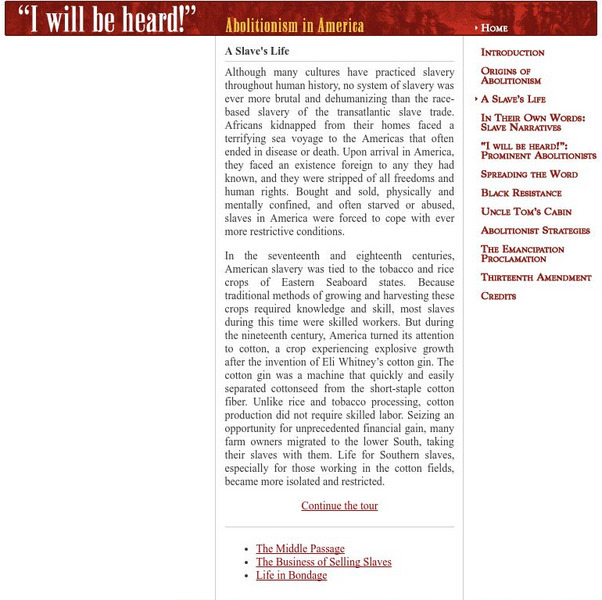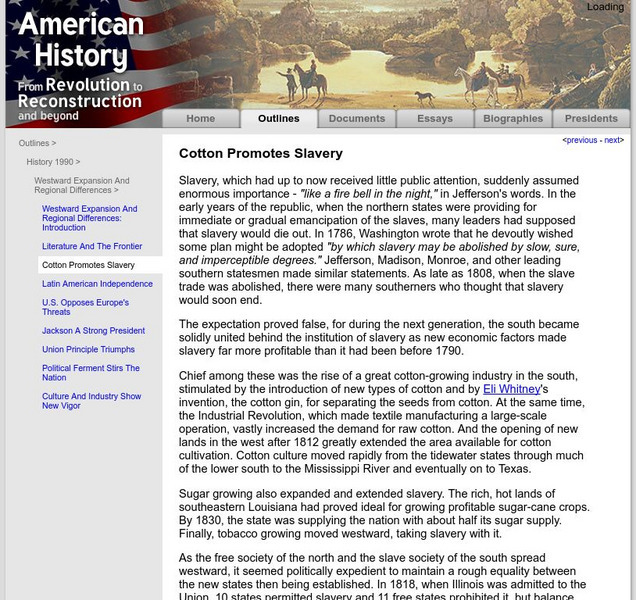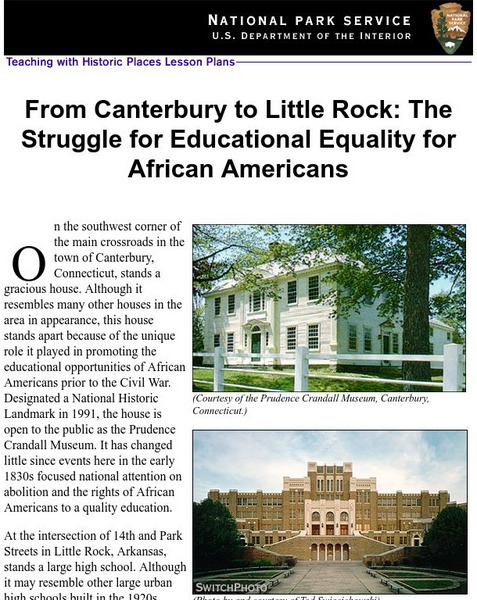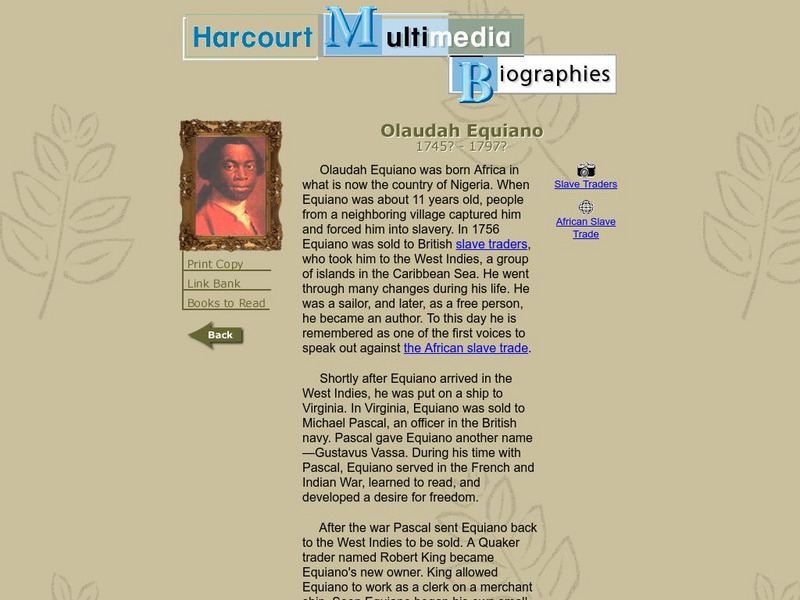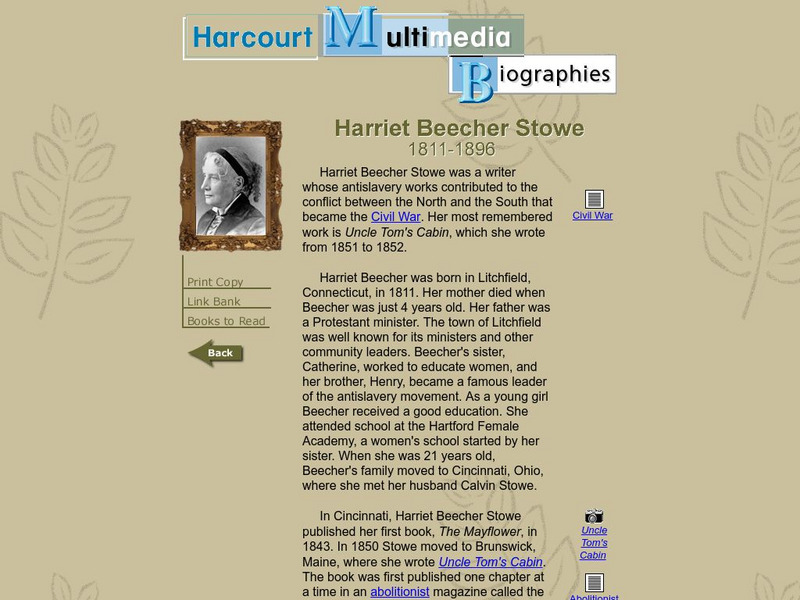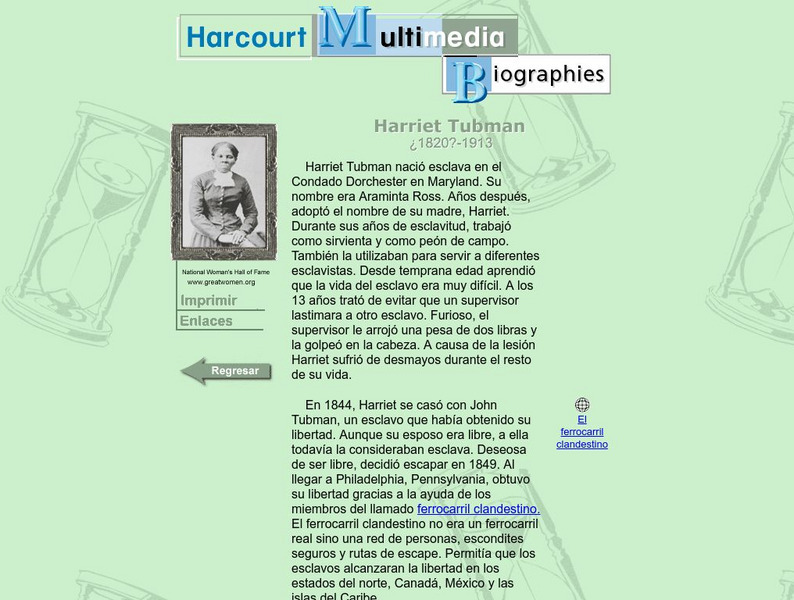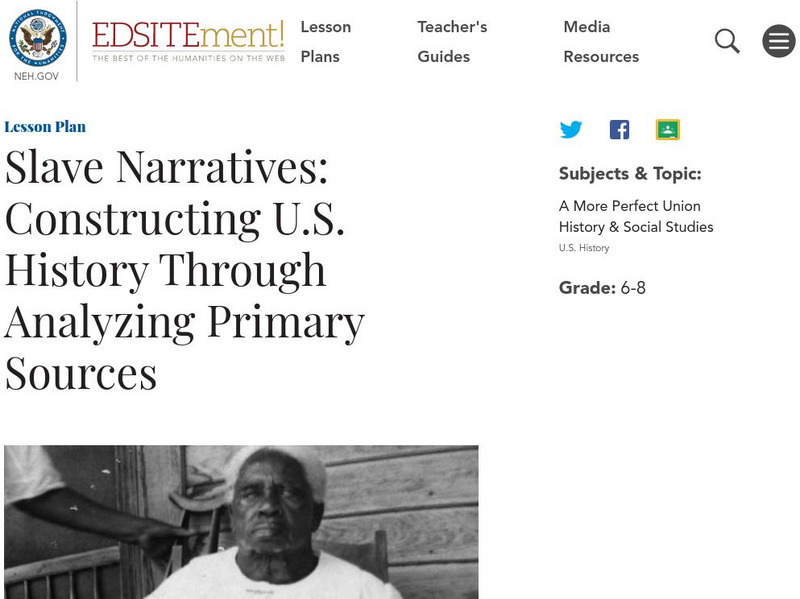PBS
Pbs Learning Media: Primary Source Set: Frederick Douglass and Abraham Lincoln
This collection uses primary sources to compare and explore the relationships between Frederick Douglass and Abraham Lincoln.
PBS
Pbs Learning Media: The Reconstruction Amendments
In this interactive lesson, students will understand and explain the key provisions of the 13th, 14th and 15th Amendments to the U.S. Constitution, commonly referred to as the Reconstruction Amendments.
PBS
Pbs Learning Media: Primary Source Set: Uncle Tom's Cabin Harriet Beecher Stowe
This collection uses primary sources to explore Harriet Beecher Stowe's Uncle Tom's Cabin.
PBS
Pbs Learning Media: Frederick Douglass: Orator, Editor, and Abolitionist
Through two primary source activities and a short video, understand how Douglass stood firm in his beliefs and rose to prominence, and explore the importance of literacy in his life.
PBS
Pbs Learning Media: Harriet Tubman: Abolition Activist
In this lesson, by examining two primary sources and watching a short video, students will become familiar with the remarkable bravery and extraordinary accomplishments of the "Moses of her people," Harriet Tubman.
iCivics
I Civics: Major Clash? Compromise!
In this lesson, students explore the reasons for and outcomes of some of the most impactful resolutions made to form the U.S. Constitution.
PBS
Pbs Learning Media: South Carolina Collection
The PBS South Carolina Collection features a range of digital resources tailored especially for Palmetto State teachers and students. Topics include early education, literacy, African American history, STEM, Common Core, and many more!
Louisiana Department of Education
Louisiana Doe: Louisiana Believes: Grade 7 Social Studies Units
Students explore the formation of the American identity as they learn early United States history from the eve of the Revolution to the end of Reconstruction
University of Richmond
Black Virginia: The Richmond Planet: 1894 1909
This curation, transcription, and interpretation of the Richmond Planet opens a window into fundamental issues of race, equity, justice, violence, and power that still stir the nation today. Thirteen formerly enslaved men formed the...
Cornell University
Cornell University: Library: I Will Be Heard: A Slave's Life
A brief look at how slavery in America was tied to the crops grown in the South. See how the need for skilled workers was decreased and the use of unskilled slaves increased with the introduction of the cotton gin.
National Humanities Center
National Humanities Center: Toolbox Library: Charles C. Jones, Triumph of Nationalism: America, 1815 1850
Plantation owner, Charles Colcock Jones, argues in two chapters from his book on promoting religious education for blacks that plantation owners have an obligation to offer religious instruction to slaves.
University of Groningen
American History: Outlines: A Divided Nation
This page from the American Revolution Project of the University of Groningen discusses how the 1850s were a time of conflicting ideas between North and South regarding the expansion of slavery. Scroll down to the third paragraph and...
University of Groningen
American History: Outlines: Cotton Promotes Slavery
A brief history of how the economic growth of the South became dependent on the work of slaves and how this solidified the unity of the southern states. Links throughout the text will take to you sites containing relevant information.
Library of Congress
Loc: Lesson Plans: Civil Rights
A rich resource on civil rights from the early struggles of African Americans during slavery on through to today. Includes seven lesson plans for multiple grade levels, with information on standards.
Library of Congress
Loc: The Peculiar Institution
This exhibit explores the methods used by Africans and their American-born descendants to resist enslavement, as well as to demand emancipation and full participation in American society. Strategies varied, but the goal remained...
Cengage Learning
American Governemnt Documents Collection: Dred Scott vs. John f.a. Sandford
This site provides a complete text of the 1857 Supreme Court decision in the case between Dred Scott and John F.A Sandford.
Library of Congress
Loc: Abolition
This site, which is provided for by the Library of Congress, is part of the African American Mosaic. It describes abolition and gives references to books about the topic.
Curated OER
National Park Service: The Struggle for Education Equality for African American
"Canterbury, Connecticut, and Little Rock, Arkansas, are links in a chain of events representing the long struggle for equal educational opportunities for African Americans. This lesson plan highlights two important historic places and...
Library of Congress
Loc: From Slavery to Civil Rights
This interactive timeline lets students select an era in the history of blacks in United States. Text tells the highlights of the time and primary source materials are linked that pertain as well.
Houghton Mifflin Harcourt
Harcourt: Biographies: Olaudah Equiano
Brief biography of former slave Olaudah Equiano, also named Gustavus Vassa.
Houghton Mifflin Harcourt
Harcourt: Biographies: Harriet Beecher Stowe
Brief biography of famous Civil War writer Harriet Beecher Stowe. Includes list of additional titles about author.
Houghton Mifflin Harcourt
Harcourt: Biographies: Harriet Tubman (Spanish Translation)
Learn about one of the great leaders of the movement to free southern slaves. Truly a life of selflessness, Harriet Tubman risked her freedom to help others escape. Find out more about this exceptional American's way of life. [Spanish...
University of Groningen
American History: Outlines: Rise of Realism
This resource provides a wealth of information about the period of American literature from 1860-1914. There are eight good articles discussing the movements of realism, regionalism, and naturalism, the rise of black American literature,...
National Endowment for the Humanities
Neh: Edsit Ement: Slave Narratives: Analyzing Primary Sources
The main focus of this lesson plan is to help students gain more knowledge about slavery and understand that no. There are links to sites with slave narratives that can be copied and analyzed in class.




